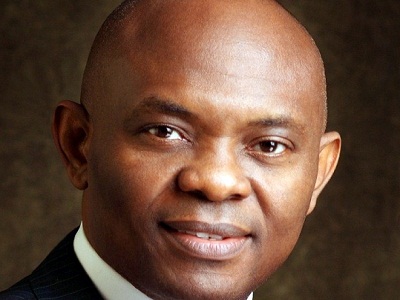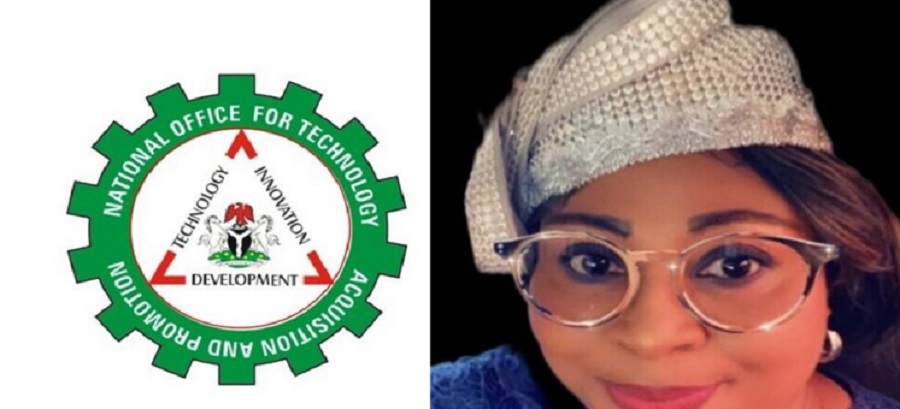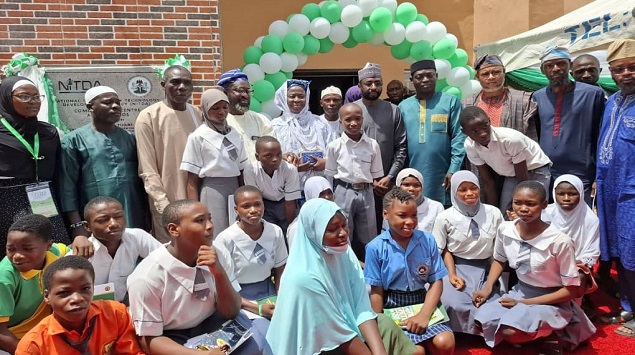General News
Operators and Expanding Demand for Mobile Broadband

The improvement in access to telephones has had positive impact in virtually all facets of life, including political, social and economic activities, thus resulting in an exponential growth in the subscriber lines due to the widespread of networks across the country.
Currently, the growth and potential earnings accruable from telecommunication services in the country’s economy is comparable to other markets in the world, and the current rate of network growth across the country is impressive.
Quite a number of global technology corporations are extending their operations to Nigeria with a multiplier effect on the economy and international trade between Nigeria and other countries of the world and in particular the West African sub region. The result of this is more competitive market environment and high potential for wired line network service providers.
Moreover, a new report by Infonetics says that it expects operators to see a 6% increase overall in revenue from mobile voice, mobile broadband, and mobile messaging services in 2012. The highest growth in 2012 will come from Asia Pacific and Latin America, while the EMEA region is expected to see a slight decline due to cutthroat competition and economic turmoil.
Globally, the mobile services market is forecast to grow to $976 billion by 2016, with the bulk of the growth coming from mobile broadband services.
“The mobile world is undeniably shifting from voice to data, as mobile operators migrate as many subscribers as they can to data service plans and smartphones.
Already in North America and Asia Pacific, mobile operators derive over 40% of their mobile revenue from mobile broadband and messaging. But, while mobile broadband is no doubt the fastest growing revenue stream for operators, mobile messaging and voice aren’t dead just yet, not by a long shot,” notes Stéphane Téral, Infonetics Research’s principal analyst for mobile infrastructure and carrier economics.
Téral adds: “The prophecies of doom for mobile operators’ SMS/MMS cash cow are being overplayed. Despite the popularity of over-the-top messaging applications like Apple’s iMessage and WhatsApp, our data shows SMS growing every year from 2012 to 2016, delivering a cumulative $1 trillion in operator revenue during those 5 years. And over that same period, voice revenue will decline only slightly, still making up a sizable chunk of operator revenues.”
Mobile data (text messaging, multimedia messaging, and mobile broadband) service revenue rose in every region in 2011, driven by an increase in smartphone usage. At more than a quarter trillion dollars in 2011, Asia Pacific generates the largest portion of mobile service revenue
Voice revenue dipped 0.8% worldwide in 2011, despite the growing use of voice services in China.
Mobile broadband subscribers will grow from 15% to nearly 40% of all mobile subscribers between 2011 and 2016.
According to another report released by ABI Research last week, the global volume of mobile data traffic will exceed 107 exabytes in 2017. This total traffic volume will be eight times more than what is expected for 2012.
Aapo Markkanen, ABI Research senior analyst points out that although the numbers may sound seemingly big, they shouldn’t be understood as yet another warning of the untamable data tsunami mobile operators often try to portray for regulatory reasons. Markkanen says, “It looks like 2015 will be the last year when the traffic volume will grow by more than 50% annually.
And that will happen despite of the fact that the monthly average per wireless subscriber, worldwide, will increase to almost 1.5 gigabytes by the end of our forecasting period.”
A lot of the overall data consumption will depend on how much of on-demand video content will in the end be delivered over cellular networks, so changes implemented by individual content providers may have far-reaching effects.
Netflix, for example, recently added to its iOS app a simple function by which users can limit their viewing to Wi-Fi only and thereby avoid overage charges. Besides accidental video streams, app downloads and updates are another activity that can be easily steered onto fixed networks.
Where are we
The number of mobile subscribers connected to mobile broadband internet has reach about 800,000 as at September last year.
Mobile Broadband is used to describe various types of wireless high-speed internet access through a portable modem, telephone or other device. Various network standards may be used, such as GPRS, 3G, WiMAX, LTE, UMTS/HSPA, EV-DO among others.
According to a recent research by Global System for Mobile Association (GSMA) made available to Nigeria CommunicationsWeek through Mr. Ross Bateson, the association’s spokesperson, the figure represents 80 percent of total Broadband subscribers in the country which is put at 1million.
He said that mobile broadband is a key social and economic development lever, driving Internet connectivity and bridging the existing digital divide.
“The rapid rise in mobile data usage in Nigeria will yield major social and economic benefits as long as there is sufficient spectrum available to meet demand. These include connectivity for businesses and consumers not reached by fixed-line broadband networks and provision of new services, particularly in rural areas,” he noted.
Wireless Intelligence report says that mobile broadband has built good momentum across Africa, with over 7 million high speed packet access (HSPA) connections and an additional 440,000 being added every month.
There are currently 29 HSPA networks across the continent with a further five being planned, and there are four planned LTE networks. Mobile Broadband has proved most successful in Africa where transparent, non-intrusive regulation has been put in place to allow competition between operators.
Bateson urged the federal government and regulators to make plans for the auctioning of 2.5GHz spectrum to support the deployment of LTE technology.
“The Nigerian Government must also start to contemplate the release of low frequency Digital Dividend spectrum. This will be instrumental in ensuring rural areas of Nigeria benefit from high bandwidth broadband connectivity,” he added.
General News
NOTAP Urges South Eastern Entrepreneurs to Embrace Franchising as Business Model

Dr. Obiageli Amadiobi, director general and chief executive officer, National Office for Technology Acquisition and Promotion (NOTAP), has advocated Franchising as a sustainable business model for the South East entrepreneurs.

Dr. Obiageli Amadiobi, DG/CEO, NOTAP
She made this call during a one-day sensitization and unveiling of the NOTAP Franchising Guidelines for south east stakeholders and entrepreneurs for a successful franchising business.
The DG who was represented at the event by Mr. Emeka Orji, head of Department Corporate Planning (CP) Department, NOTAP, said that franchising business model had globally been proven to be successfully sustainable due to low business risks associated with it.
She defines franchising as a contractual business relationship between a licensor (the franchisor) and a licensee (the franchisee) that allows the business owner to use the licensor’s brand and methods of doing business to distribute products or provide services to consumers.
She added that in essence, the franchisee pays the franchisor for the opportunity to use his established business model and brand name in running his business.
Dr. Amadiobi said the essence of the workshop was not just organised to explore the possibility of adopting franchising as a strategic platform to transform local dreams into national and global business realities.
She described the programme as an opportunity for business owners and intending entrepreneurs from the Zone to latch into the huge and untapped potentials provided by franchising business models in becoming business and brand ambassadors.
With over 800,000 franchise establishments across the globe, generating trillions in revenue, she described Franchising as a pathway to economic empowerment.
General News
FG Launches Online Citizenship, Business Management Portal to Enhance Transparency, Service Delivery
The Federal Government has launched a new Online Citizenship and Business Management Platform, in a bid to boost transparency, operational efficiency, and service delivery. The initiative, unveiled by the Ministry of Interior, is in line with the Renewed Hope Agenda of President Bola Ahmed Tinubu.
![]()
The platform is designed to simplify and accelerate the processing of citizenship and business-related services, allowing individuals and corporate entities to carry out transactions seamlessly from anywhere in the world.
According to a statement issued by Magdalene Ajani, Permanent Secretary of the Ministry, the digital platform represents a significant milestone in the Ministry’s ongoing reform agenda.
It noted that the new system would drastically reduce bureaucratic bottlenecks, enhance user experience, and improve turnaround time for applications. “The Ministry is committed to promoting a more efficient, transparent, and secure framework for citizenship administration.
“This digital transformation is a testament to our resolve to improve public service delivery through the use of technology”, the statement reads.
Members of the public, private organisations, and other stakeholders can now access the platform through the Ministry’s official website: https://interior.gov.ng, or directly via the portal: https://candb.interior.gov.ng. For technical support or inquiries, users can contact: candb-support@interior.gov.ng.
The Ministry emphasised that the launch of this platform is just one of several digital initiatives aimed at transforming the nation’s administrative processes and aligning them with global best practices.
Observers believe the platform could become a game-changer in reducing red tape and promoting a more investor-friendly environment in Nigeria, particularly in areas involving citizenship acquisition and business operations.
General News
NITDA DG says its Community IT Centres Should be a Catalyst of Change

Kashifu Inuwa Abdullahi, director general of National Information Technology Development Agency (NITDA) has said that the 18 community IT centre the agency has built in the past two years are meant to be a beacon of calls and catalyst of change in those communities where they are cited.

He sated this at the commissioning/handing over of IT centre at Akesan area in Lagos. He noted that the IT centres, Innovation hubs among others are part of digital literacy programme of the agency.
“This center is designed and build to help Akesan community to be part of the digital economy, because the President is big and loud when it comes to national prosperity and inclusivity.
“Our target is to build more than 1600 across the country. We want every community every Nigerian to be part of this national prosperity and inclusivity when it comes to digital economy.
“Today, we are here to commission it, to ensure and encourage you to put it in a good use, because we call it a community center means that we want everybody to be part of it. We don’t want it to be suited in a school where the school will lock it for only students and the staff.
“That’s why we located it in the community. Schools can be part of it. Our senior citizens can be part of it. Our religious centers also can be part of it to learn.
“We want it to be a beacon of call as well as a catalyst of change in this community. We want to see more information technology gurus coming from Akesan community. So, I want to encourage you to also come with a sustainability model so that the center will be on. It is on because when you invest in this kind of infrastructure, we don’t want to be called when there are small things that we should come and fix it. That’s why we are handing it over to the community so that the community can put it in a good use. The community can find a way to make it self-sustaining,” he said.
Dr. ‘Bosun Tijani, Honourable Minister of Communications, Innovation & Digital Economy, the NITDA Community Centre in Lagos, a space that is more than just a building. It is a strategic extension of our national mission – a bridge between the Federal Government’s digital economy policies and the unmatched energy, ingenuity, and innovation that Lagos represents.
The minister who was represented by Mr. Johnson Bareyei, director, e-governmance in the ministry, added that his ministry is committed to promoting inclusivity through capacity building initiatives like the 3MTT programme.
“We are also developing the National Digital Economy & e-Governance Bill, which is a robust legislative framework that will help guide our everyday engagement online.
“Our work at the Ministry also includes Project BRIDGE, our ambitious effort to improve interconnectivity by deploying 90,000km of fibre-optic cable across Nigeria. This is a critical imperative as we work towards making Nigeria a $1trillion economy powered by innovation, infrastructure, and inclusive growth,” he said.

 Telecom3 days ago
Telecom3 days ago₦800 Billion Infrastructure Plan Set to Boost MTN’s Network Quality Nationwide

 News3 days ago
News3 days agoCreative Economy Ministry Secures $300M Investments Commitment

 E-Business3 days ago
E-Business3 days agoNITDA, CISCO Empower Youth with Digital Skills

 E-Financial3 days ago
E-Financial3 days agoFidelity Bank reclaims trillion-naira market cap as stock rises to ₦21

 Telecom3 days ago
Telecom3 days agoAfrican Women Hit Hardest as Mobile Internet Gender Gap Persists

 General News3 days ago
General News3 days agoNITDA DG says its Community IT Centres Should be a Catalyst of Change

 Telecom3 days ago
Telecom3 days agoRemita’s Bold Leap: Nigeria’s Fintech Giant Expands Across Africa

 E-Financial3 days ago
E-Financial3 days agoKuda Co-founder Urges Young Developers to Build Tech with Purpose @NACOSS 2025
























